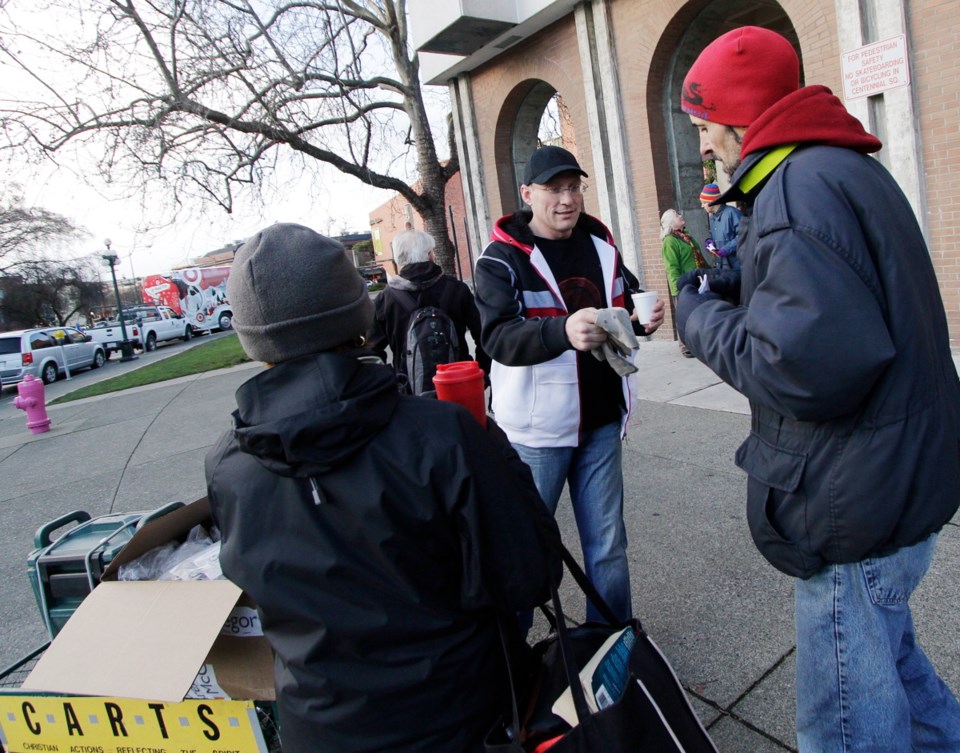It was a bit of a shock to hear Wade Churcott had died.
Just last October, the 39-year-old was the poster boy for the fight against homelessness, speaking at the official opening of the publicly funded Queens Manor housing project in a former Traveller’s Inn on Douglas.
After 18 months on the street, it was such a relief to have a real bed, a real roof, Churcott told the well-dressed crowd.
“I got the word that I had a place to stay, and I cried.”
Then, at the end of March, he was dead of an apparent overdose. Rev. Al Tysick, who conducted a memorial for Churcott, says more than one person has been claimed by some funky heroin on Victoria’s streets recently.
It was a sobering reminder that street problems and solutions aren’t as cookie-cutter clean as we would like. It’s not as simple as saying “we pay for housing, and you stop being an addict, or stop being mentally ill.”
Tysick sees the complications every day, making the rounds of the dysfunctional and dispossessed in a routine that begins well before dawn.
I met him at the Rock Bay Landing shelter, where at 5:15 a.m. those not lucky enough to get one of the 90 beds were slumped in chairs or sleeping on the reception-area floor as a Muslim man, kneeling on a towel inside the front door, performed his morning prayers.
Just up the street, a score of people — 16 men, four women — waited in the loading dock of a vacant commercial building. Early risers from the shelter, where they can stay for up to 30 days, they clustered around Tysick’s Dandelion Society van as he doled out coffee, doughnuts and bagels.
Having come from Rock Bay Landing, they were in better shape than the two dozen bedraggled souls found in front of the Seventh Day Adventist Church on Pandora a few minutes later. This group had a variety of reasons for sleeping rough — maybe they had been barred from the shelters, or were intoxicated, or just couldn’t find a bed. Three were in mobility scooters. A graduate of the Banff School of Fine Arts leaned on a cane while speaking authoritatively of Margaret Laurence, Al Purdy and Irving Layton.
Farther down Pandora the evidence of cocaine addiction was on display — nervous energy and quick-twitching bodies. Over on Government Street, under the come-hither gaze of the lurid posters outside the now-closed Monty’s strip club, a grizzled old man shivered in a wheelchair under a pile of damp blankets; Tysick promised to bring him a sleeping bag. The 700 block of Fort Street resembled row-housing, one or two blanketed figures filling four consecutive doorways.
These people make up just a thin slice of the poverty pie, but they’re highly visible. The powers that be would prefer they be relatively invisible by 7 a.m., when the city starts coming to life. Tysick is the alarm clock/shepherd, doling out food, dry socks (“you don’t have to wash the black ones as often,” he deadpans) and one cigarette per person. The smokes allow him to keep track of numbers; he was on his fourth pack of 20 by the time the morning’s rounds were over.
The handouts are just a means to make contact, to see who is sick and needs to be put up in a motel for a couple of days, or who needs a stronger voice to argue with officialdom. People who are difficult to deal with sometimes get treated poorly, need an advocate. Tysick estimates three-quarters are addicted, mentally ill, or both; the rest are headed that way.
Some are their own worst enemies, getting housed, only to get chucked out because of bad behaviour. Even the churches grow exasperated, erecting “no trespassing” signs (and, in one case, razor wire) that Tysick finds at odds with the love-thy-neighbour message. “Let’s not preach it from the pulpit and do something else.”
He would like to see one of the existing social-service agencies open a purpose-built “high-tolerance” shelter for the people whose conduct leaves them on the street. Good luck finding the money to run it, though. It’s way beyond the capacity of his shoestring organization: To avoid paying rent, Dandelion stores supplies in a funeral home and borrows a businessman’s office from 7-9 a.m. each day, before the guy needs it.
Tysick’s last stop was outside the Castle Building Centre on Cook Street. This is where Churcott used to sleep. Last fall, on the day Churcott learned he would be moving into Queens Manor, someone had just stolen all his possessions, the clothes, books and blankets he carried in two plastic garbage bags. It was the fourth time it had happened in the 3 1/2 months he had been sheltering outside the building.
At that time, Churcott described himself as having been addicted and homeless for much of the past 25 years. His criminal record was what you might expect.
But he also seemed eager to keep his chin up. In December, the Times Colonist photographed him volunteering with a couple of faith-based groups handing out socks to those in need. He would offer to flip burgers at Open Door barbecues, that sort of thing, Tysick says.
Tysick also says Churcott was a bit of a rarity, a street guy who mixed well not just with other street guys, but with politicians and church-goers. “He had that intelligence, that savvy, that enabled him to be in any crowd.”
It wasn’t enough to survive. There are no magic solutions, only people who try.



